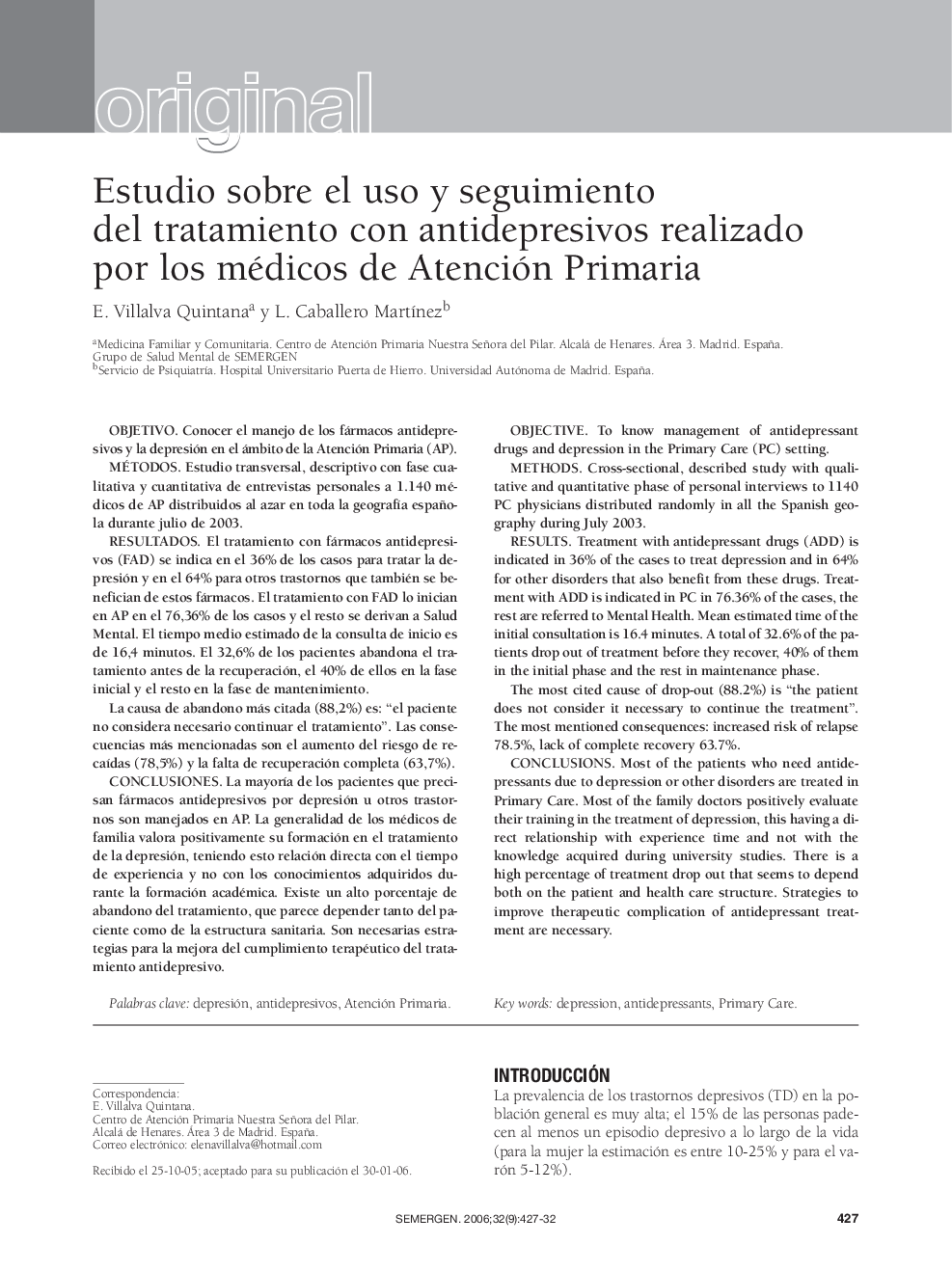| Article ID | Journal | Published Year | Pages | File Type |
|---|---|---|---|---|
| 3835968 | SEMERGEN - Medicina de Familia | 2006 | 6 Pages |
ObjetivoConocer el manejo de los fármacos antidepresivos y la depresión en el ámbito de la Atención Primaria (AP).MétodosEstudio transversal, descriptivo con fase cualitativay cuantitativa de entrevistas personales a 1.140 médicos de AP distribuidos al azar en toda la geografÃa española durante julio de 2003.ResultadosEl tratamiento con fármacos antidepresivos (FAD) se indica en el 36% de los casos para tratar la depression y en el 64% para otros trastornos que también se benefician de estos fármacos. El tratamiento con FAD lo inician en AP en el 76,36% de los casos y el resto se derivan a Salud Mental. El tiempo medio estimado de la consulta de inicio es de 16,4 minutos. El 32,6% de los pacientes abandona el tratamiento antes de la recuperación, el 40% de ellos en la fase inicial y el resto en la fase de mantenimiento. La causa de abandono más citada (88,2%) es: “el paciente no considera necesario continuar el tratamiento”. Las consecuencias más mencionadas son el aumento del riesgo de recaÃdas (78,5%) y la falta de recuperación completa (63,7%).ConclusionesLa mayorÃa de los pacientes que precisan fármacos antidepresivos por depresión u otros trastornos son manejados en AP. La generalidad de los médicos de familia valora positivamente su formación en el tratamiento de la depresión, teniendo esto relación directa con el tiempo de experiencia y no con los conocimientos adquiridos durante la formación académica. Existe un alto porcentaje de abandono del tratamiento, que parece depender tanto del paciente como de la estructura sanitaria. Son necesarias estrategias para la mejora del cumplimiento terapéutico del tratamiento antidepresivo.
ObjectiveTo know management of antidepressant drugs and depression in the Primary Care (PC) setting.MethodsCross-sectional, described study with qualitative and quantitative phase of personal interviews to 1140 PC physicians distributed randomly in all the Spanish geography during July 2003.ResultsTreatment with antidepressant drugs (ADD) is indicated in 36% of the cases to treat depression and in 64% for other disorders that also benefit from these drugs. Treatment with ADD is indicated in PC in 76.36% of the cases, the rest are referred to Mental Health. Mean estimated time of the initial consultation is 16.4 minutes. A total of 32.6% of the patients drop out of treatment before they recover, 40% of them in the initial phase and the rest in maintenance phase. The most cited cause of drop-out (88.2%) is “the patient does not consider it necessary to continue the treatment”. The most mentioned consequences: increased risk of relapse 78.5%, lack of complete recovery 63.7%.ConclusionsMost of the patients who need antidepressants due to depression or other disorders are treated in Primary Care. Most of the family doctors positively evaluate their training in the treatment of depression, this having a direct relationship with experience time and not with the knowledge acquired during university studies. There is a high percentage of treatment drop out that seems to depend both on the patient and health care structure. Strategies to improve therapeutic complication of antidepressant treatment are necessary.
